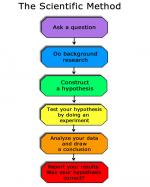|
This section contains 3,074 words (approx. 11 pages at 300 words per page) |

|
Thought experiments in science are generally characterized by contrast to actual experiments: The former are conducted by engaging in an imaginative act, the latter by manipulating features of the observed world. So if to perform an (actual) scientific experiment is to conduct an empirical test under controlled conditions with the aim of illustrating, supporting, or refuting some scientific hypothesis or theory, then to perform a scientific thought experiment is to reason about an imaginary scenario with a similar aim. In the case of actual experiments, the theory-relevant evidence generally takes the form of data concerning the behavior of the physical world under specific conditions; in the case of thought experiments, the theory-relevant evidence generally takes the form of intuitions (or predictions) concerning such behavior. In both instances, imagining or performing the experiment ostensibly results in new knowledge about contingent features of the...
|
This section contains 3,074 words (approx. 11 pages at 300 words per page) |

|


